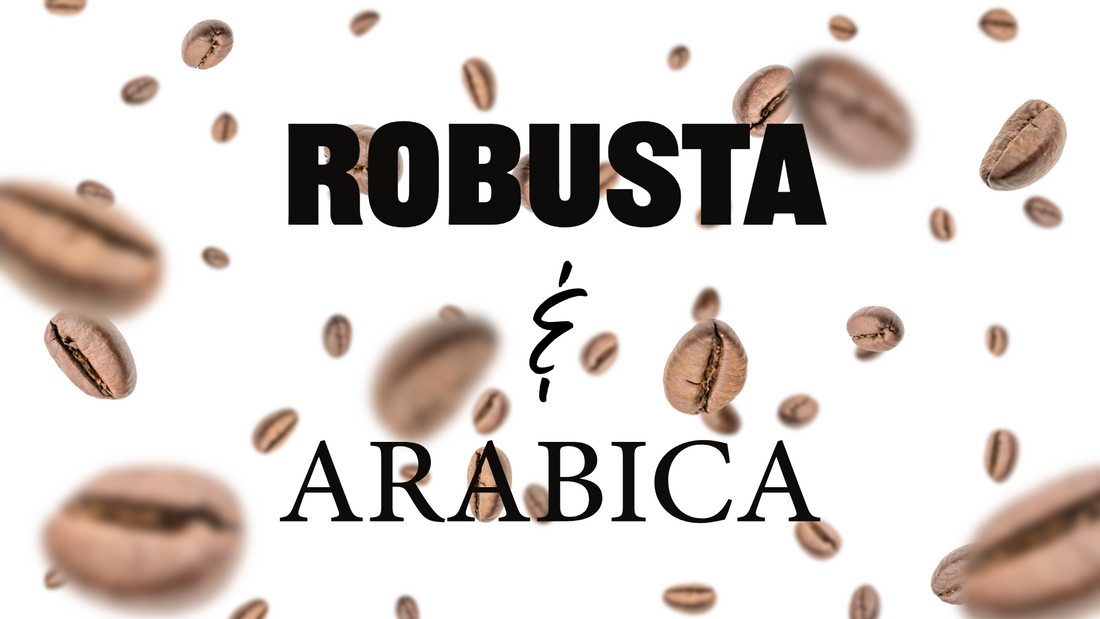Robusta And Arabica
Part One:
We have always advocated for high-altitude, shade-grown Arabica coffee as a means to support biodiversity and contribute to rainforest preservation. Though far from an ideal way of preserving rare and sensitive equatorial ecosystems, making these areas more valuable as high end specialty arabica coffee farms does preserve some habitat for birds and animals. The robusta alternative is more of a monoculture, clear-cutting, high-yield, high-efficiency farm.
We've been teaching this viewpoint for decades, however, in the past five years, we've observed a surge in Robusta proponents and a proliferation of pro-Robusta articles.
We were equally puzzled when the Rainforest Alliance certified non-shade coffee plantations, although we should have seen this coming as observers have been warning of the steady de-evolution of shade requirements over the years. We were then completely baffled when Robusta-specific Q grading standards for specialty coffee designation were proposed recently.
Now, in 2024, we are on the brink of an all-out blitz promoting the benefits of Robusta, with some specialty coffee enthusiasts claiming, "it really doesn't taste that bad."
More concerning, we see scare tactics in full swing across various media, reminiscent of the issues Julie Craves addressed in her 2012 article, "Is Coffee Really at Risk of Extinction."
So we have to ask what is motivating the shifts in policy and the attempts to change consumer acceptance of robusta as a direct substitute for Arabica?
In trying to research these issues objectively, one question kept popping up.
Is Robusta robust?
Does Robusta live up to its namesake? Does it really display GMO-like resistance to disease, pests and global warming?
Or is it all folklore and myth?
Our investigation is far from complete, but so far we have found the following claims:
- Tolerance to leaf rust
- Higher caffeine in Robusta concentration deters pests
- Higher temperature resistance
- Better drought tolerance
- Higher yield
- Easy to grow
- No need for high altitude farms
If we assume for a moment that all the above traits were true then why haven't centuries of Arabica farmers ripped out their Arabica varieties and replanted with Robusta? Why wouldn't farmers want a super coffee plant?
The blunt answer is Robusta tastes like shi%.
Arabica has been preferred over Robusta because it has always tasted better.
This is why farmers throughout the hundreds of years of coffee growing history have struggled to maintain Arabica plantations in difficult high-elevation mountainside plantations.
This is why Arabica farmers have maintained groves of tall trees to provide shade and wind protection for delicate Arabica plants.
And this is also why Arabica coffee farmers with small sized and highly elevated land have laboriously hand picked their crop. It's all in the pursuit of better taste and quality.
As for those people who make the claim that “specialty grade Robusta” can compete with and substitute for specialty grade Arabica, then why create a whole new scoring system for Robusta when we already have a scoring system for coffee?
That's like creating a new grading system for yellow spotty diamonds so we can call the best yellow, spotty diamonds .. flawless.
Doesn't make much sense does it?
Part Two: Busting Robusta
In Part Two we dig deeper into the Robusta world and see if the myths are true or #busted.
So we have to ask again: What is motivating the shifts in policy and the attempts to change consumer acceptance of Robusta as a direct substitute for Arabica?
Claim #1 – Robusta is immune to leaf rust
Leaf rust is a major threat to Arabica farmers. While Robusta may have some immunity to certain forms of leaf rust, make no mistake: Robusta plants can and do get leaf rust. Immunity? Not quite. #busted
Claim #2 – Higher caffeine makes Robusta pest-proof
Caffeine is a poison—at least to some insects and animals. If insects ingest large amounts, they can die, but caffeine’s bitter taste often works more as a deterrent than a killer.
Interestingly, some pollinators, like bees, actually prefer nectar from plants containing caffeine. There may well be insects with similar tastes.
As for animals, most of the online information points to dogs and cats dying from ingesting chocolate and/or coffee. Chocolate contains caffeine, and some breeds lack the enzyme to process it. Sources say poodles, for instance, can’t tolerate chocolate at all. Given the popularity of poodle mixes these days, the safest advice: no chocolate chip cookies or lattes for your pets.
That said, some wild animals do consume coffee cherries. Humans have capitalized on this fact—sometimes in disturbing ways—by harvesting beans from their droppings. Elephants, certain monkeys, and civet cats have all contributed to the bizarre “predigested coffee” market.
Why on earth would anyone want to drink coffee that’s been partially digested and then… retrieved… is beyond me. And to pay a premium for it? If you insist on sampling the madness, maybe opt for monkey coffee—it’s spit out, not “anal evacuation.” Still, why? For the love of all that’s holy, why? I’m sure I could find you a source for pre-digested oats for your morning “probiotic oatmeal”.
The bigger point: caffeine exists in the leaves, fruit, and seeds—but not in the roots or wood. That means pests like nematodes and the coffee borer beetle, which attack the roots and stems, will munch Robusta just as happily as Arabica. #busted
Claim #3 – Robusta is more temperature-resistant than Arabica
This claim has been challenged. Edoardo Zanato’s work and research from the University of Michigan (https://web.archive.org/web/20240619210608/https://coffeextraction.com/coffee-basics/robusta-coffee-risk-coffee-myth/) suggest the opposite: Robusta’s optimal growing temperature is around 20.5°C—lower than Arabica’s—and yields drop sharply when temperatures exceed that. Above optimal, Robusta yields can drop by 14% per degree of warming. That’s not invincibility—it’s vulnerability.
So why the name “Robusta”? It misleads people into thinking it’s a super-plant. The reality: Robusta’s main agronomic advantages are drought tolerance, pest resistance, and deeper root systems. If those traits are valuable, why not graft them into Arabica rootstock rather than replace Arabica entirely?
Grafting Robusta: An Overlooked Option
Rather than replace Arabica with Robusta, some researchers have explored grafting Arabica scions onto Robusta rootstock. Studies suggest grafting doesn’t significantly change caffeine, fat, or sucrose levels, and it can offer benefits like nematode resistance. It’s a path worth pursuing—yet the current push is to market Robusta as the new specialty darling instead.
Pollinators: A Hidden Vulnerability
Arabica can self-pollinate, but still benefits from insect pollination. Robusta, on the other hand, is primarily cross-pollinated and far more dependent on insect activity. With global pollinator populations in decline, this makes Robusta inherently more vulnerable to yield drops in the absence of healthy bee populations.
Monoculture Robusta farms—especially sun-grown—harm biodiversity and pollinator health, undermining their own long-term viability.
Bird Habitat and Shade-Grown Reality
Robusta’s higher yields come most easily from sun-grown systems, which often replace shaded, biodiverse Arabica farms. The irony: some certification programs have even allowed sun-grown Robusta to carry “bird-friendly” labels. As ecologist Julie Craves has long pointed out, that’s ecological doublespeak.
“genetic biodiversity should be preserved regardless of it’s commercial value” Julie Craves
Julie Craves on the Future of Coffee
“ I think the short answer -- in the long term -- is that we are likely to end up with coffee plants that have been bred with genes/characteristics that provide some combination of temperature tolerance, taste, and disease resistance, perhaps even tailored to particular geographic regions. Inevitably, it will incorporate robusta genes.
However, the instability of climate change is already upon us, and coffee (even genetically manipulated experimental types) is a very slow crop to evaluate. Thus, my short answer -- in the short term -- is that there will be more deforestation as arabica must move "uphill" and robusta crops occupy new lands. The same push for profits will mean that large corporations will (are) promote lesser grades of coffee and robusta in order to convince people to expect less in the face of lost production/profit of arabica.
Regarding temperature tolerance of robusta: of course, every plant has tolerances, and they will vary across the globe. Robusta is more tolerant of climate conditions than arabica, but there are too many variables to generalize a whole lot.
Overall, robusta coffee and the whole mess of climate "certifications" and "standards" is no longer my area of expertise. While I follow along with coffee issues, my frustration at the consolidation of coffee buyers has led me to stall out on writing about coffee. The decline of Rainforest Alliance standards was/is especially discouraging.
Cheers,
Julie
--
Julie A. Craves
Ecologist/Writer
Coffee & Conservation
http://www.coffeehabitat.com “
The Q Grading Question
There’s Arabica Q grading. There’s Robusta Q grading. Why two systems? Why not one unified “Q Coffee” standard, as we have in wine—where red and white are scored on the same scale?
If Robusta can actually taste better than Arabica under that system, fine—charge the same. But the dual grading system feels like an artificial separation, and risks marketing manipulation.
The Takeaway
We’re fine with improving Robusta. We’re fine if it genuinely matches or exceeds Arabica in cup quality. But science—not marketing—should lead the way. That means busting myths, confronting uncomfortable truths, and asking harder questions about biodiversity, certification, and who really benefits from shifting the specialty market toward Robusta.
Part Three may have to tackle the elephant in the room: the corporate strategies, PR campaigns, and money trails driving the Robusta narrative.
Notable Articles and References:
Robusta (canephora) Tasting Flavour Wheel
Q Robusta Certification to Begin at CQI
New Rainforest Alliance criteria for shade
Is coffee really at risk of extinction?
Fine Robusta Standards and Protocols
Historian Explores the Dark Side of Coffee - U of G News
The rise of Robusta towards speciality | CBI
Climate change — Coffee & Conservation
Coupling of pollination services and coffee suitability under climate change
Temperature and rainfall impacts on robusta coffee bean characteristics - ScienceDirect
Not so robust: Robusta coffee production is highly sensitive to temperature
https://coffeextraction.com/coffee-basics/robusta-coffee-risk-coffee-myth/



